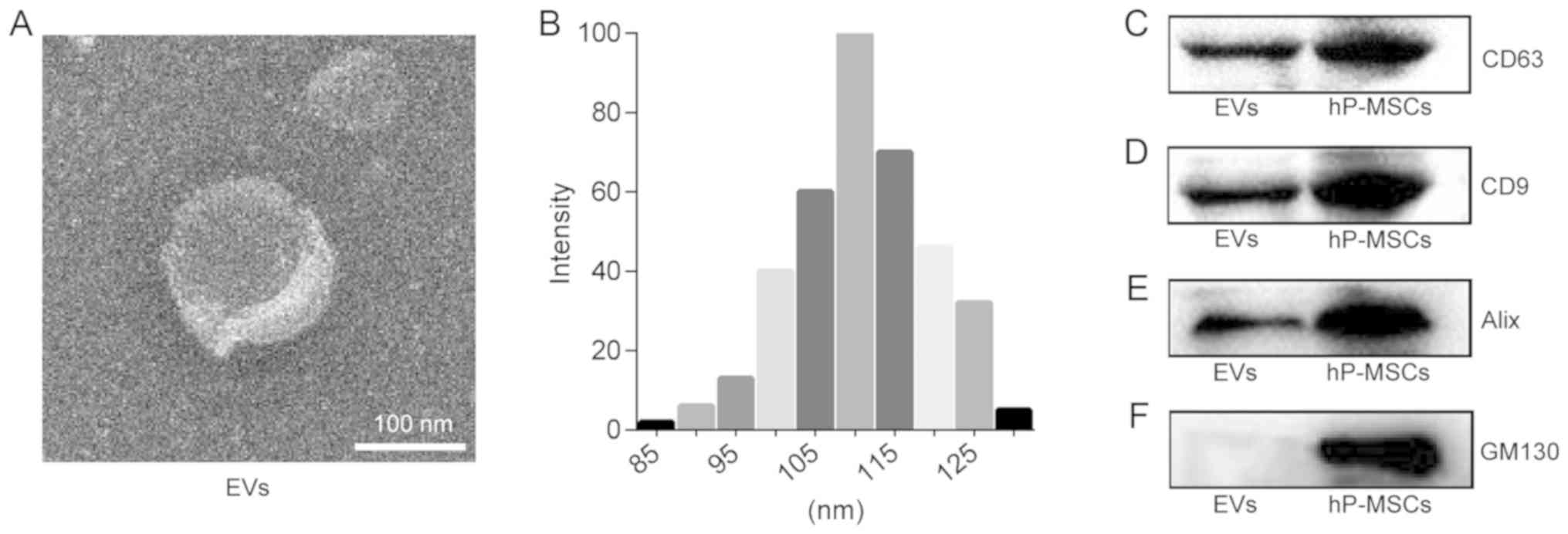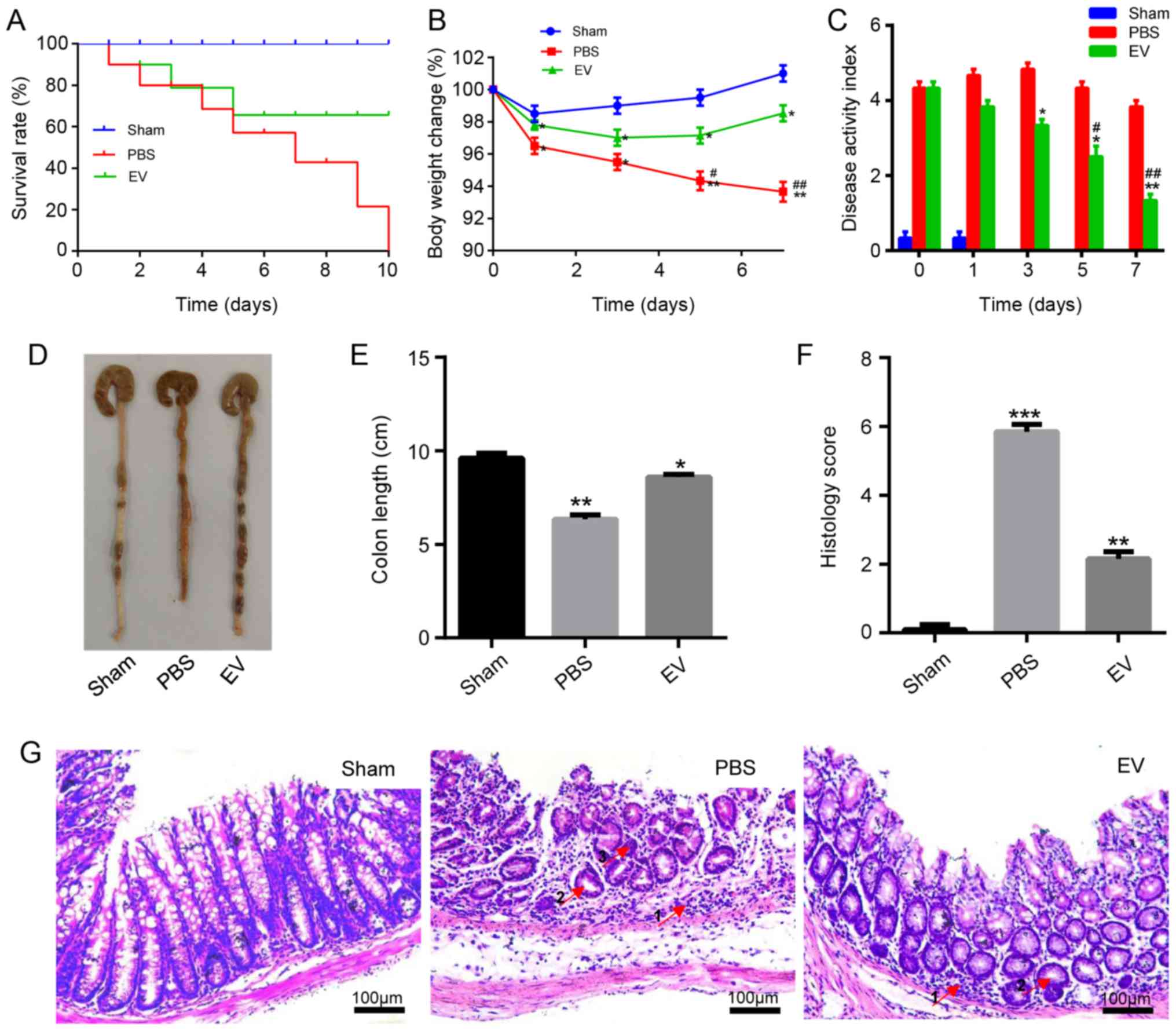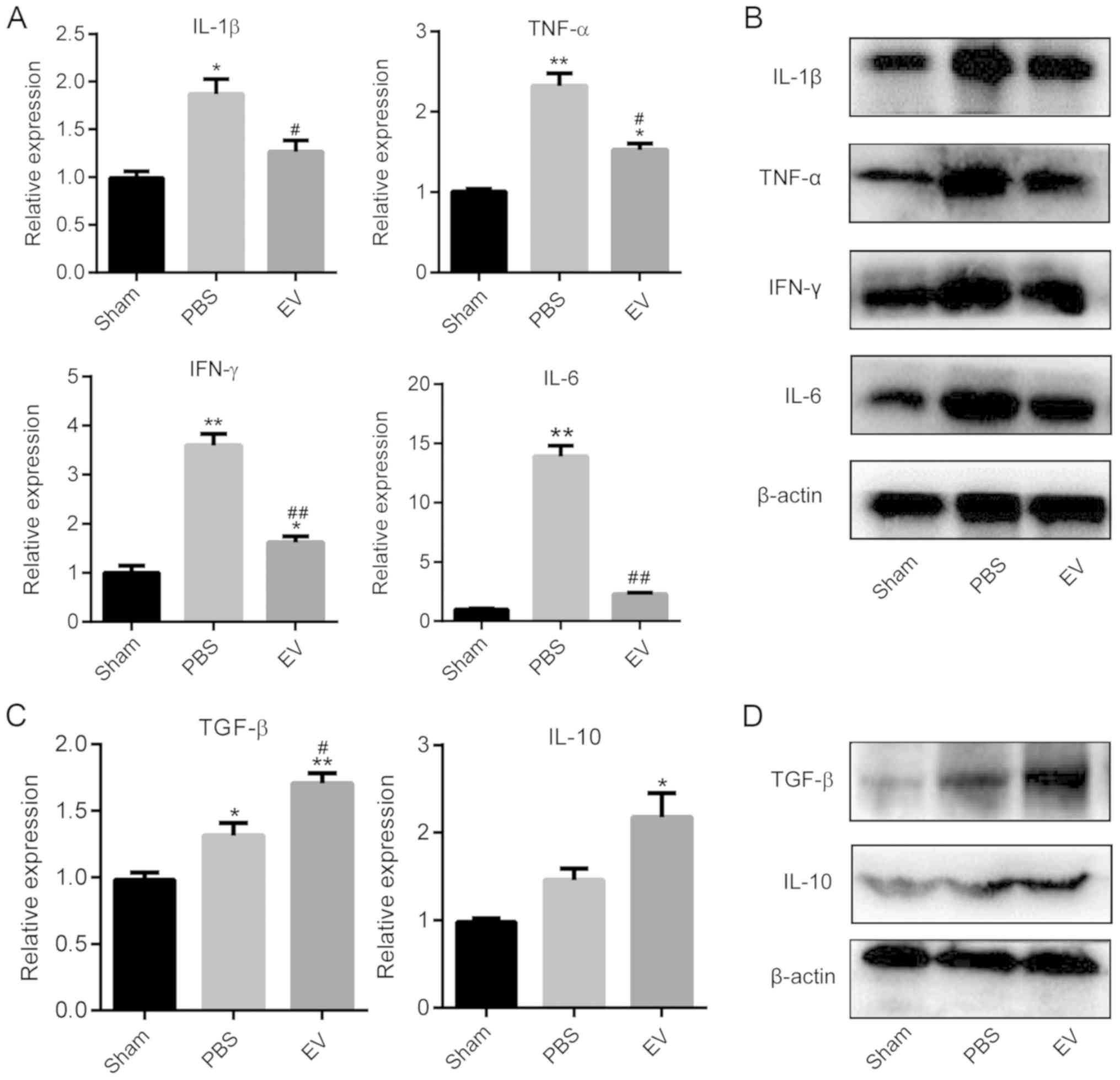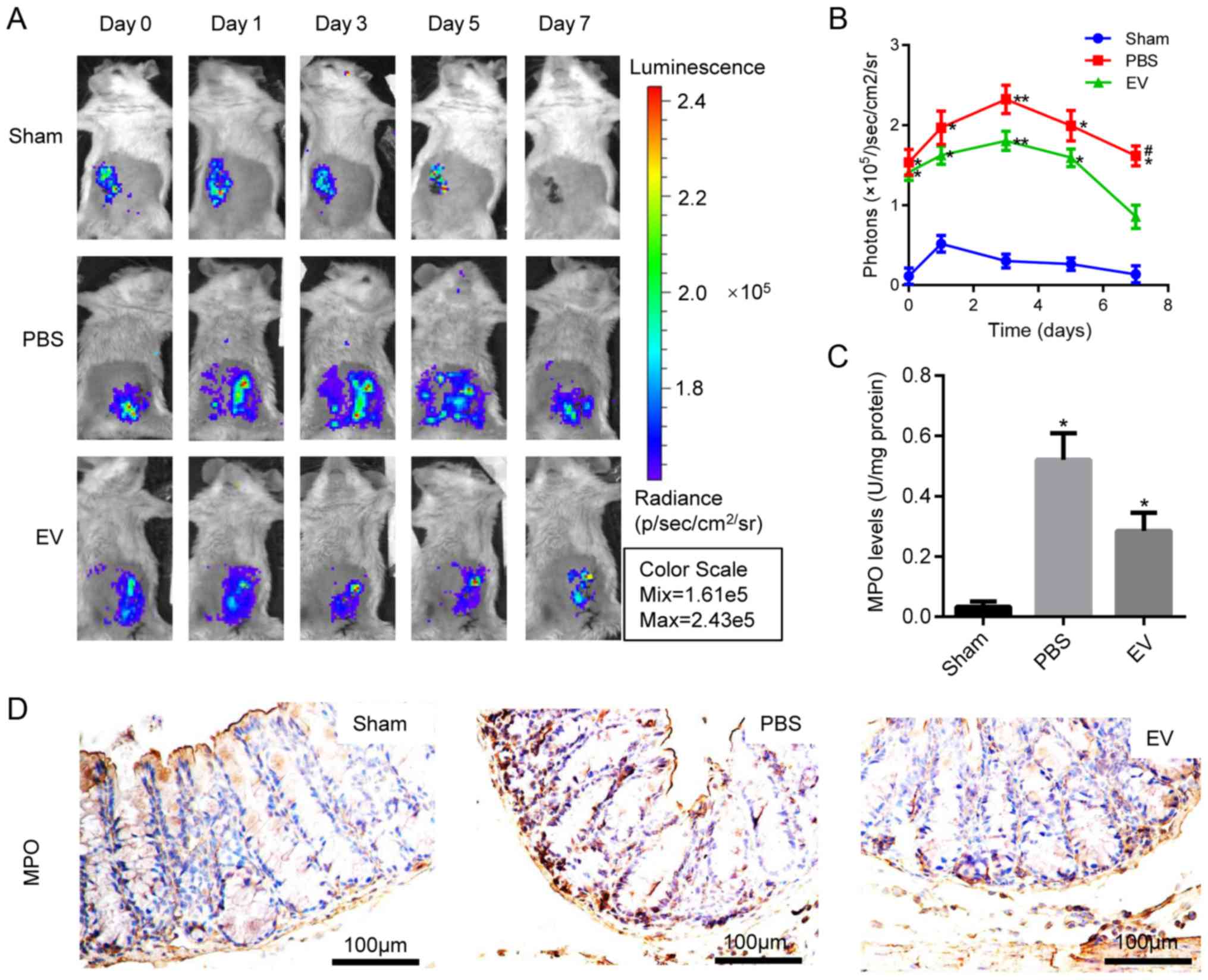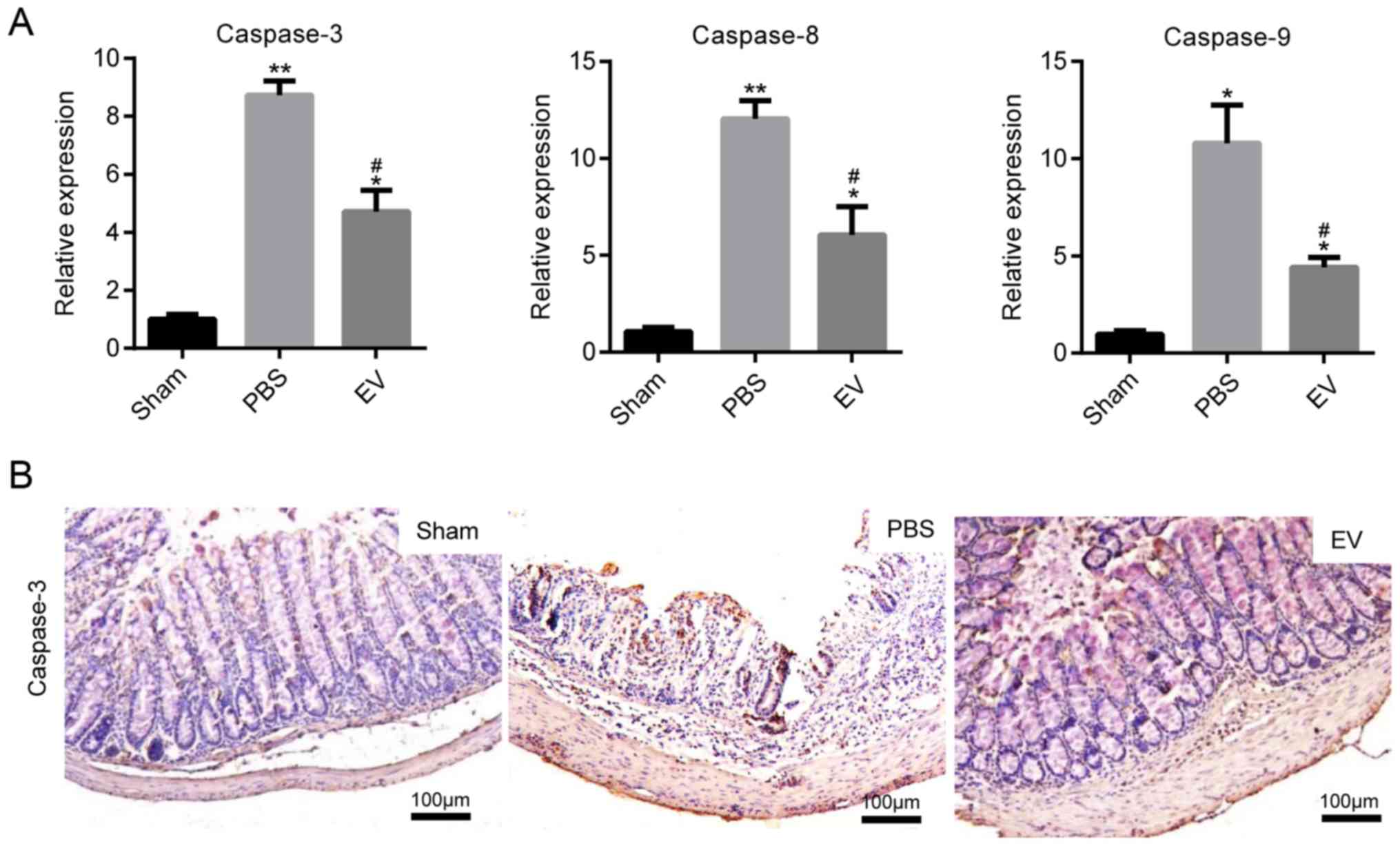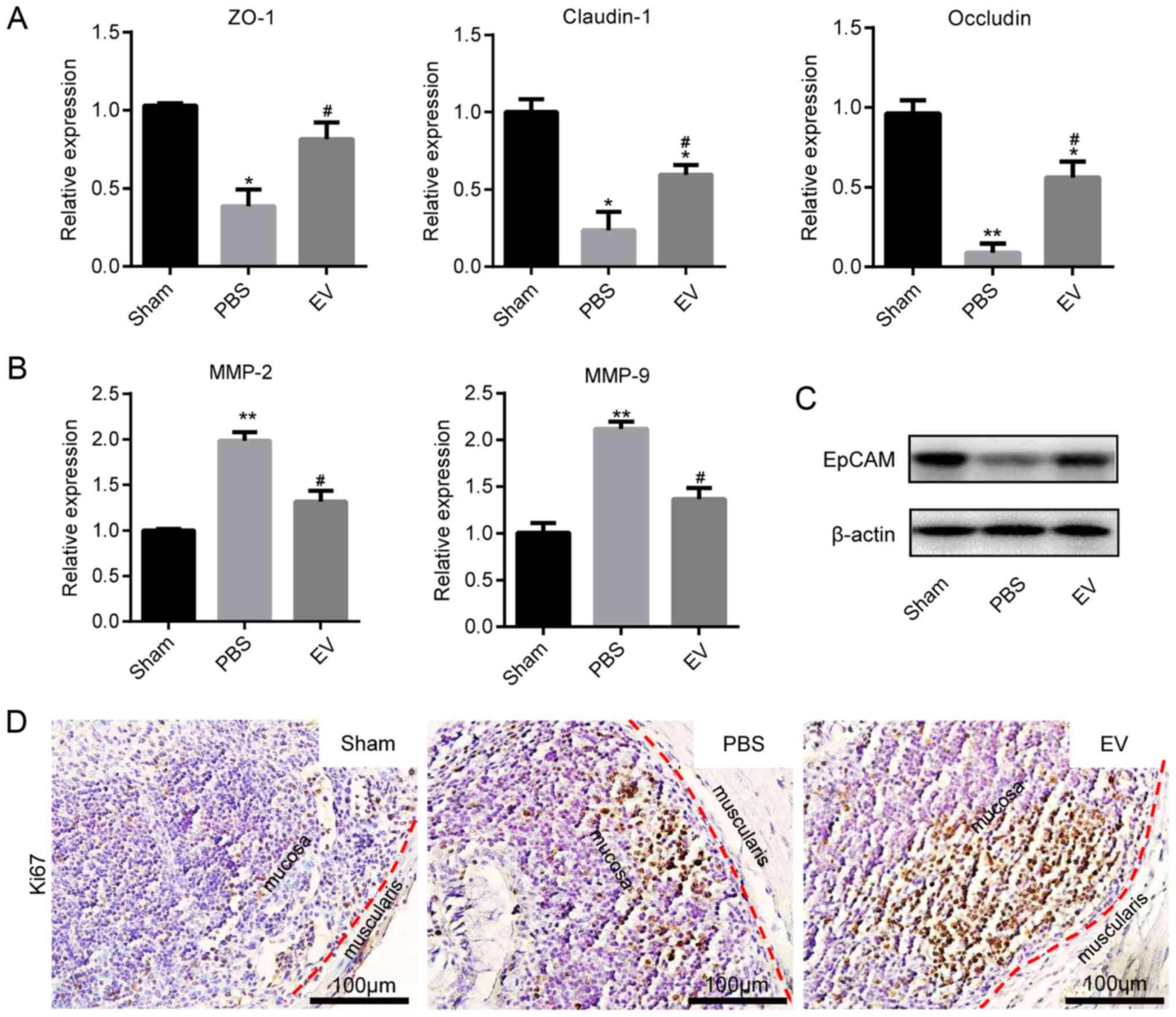|
1
|
Kim DH and Cheon JH: Pathogenesis of
inflammatory bowel disease and recent advances in biologic
therapies. Immune Netw. 17:25–40. 2017. View Article : Google Scholar : PubMed/NCBI
|
|
2
|
Chen X, Cai C, Xu D, Liu Q, Zheng S, Liu
L, Li G, Zhang X, Li X, Ma Y, et al: Human mesenchymal stem
cell-treated regulatory CD23+CD43+ B cells alleviate intestinal
inflammation. Theranostics. 9:4633–4647. 2019. View Article : Google Scholar :
|
|
3
|
Manichanh C, Borruel N, Casellas F and
Guarner F: The gut microbiota in IBD. Nat Rev Gastroenterol
Hepatol. 9:599–608. 2012. View Article : Google Scholar : PubMed/NCBI
|
|
4
|
Baumgart DC and Sandborn WJ: Crohn's
disease. Lancet. 380:1590–1605. 2012. View Article : Google Scholar : PubMed/NCBI
|
|
5
|
Ordás I, Eckmann L, Talamini M, Baumgart
DC and Sandborn WJ: Ulcerative colitis. Lancet. 380:1606–1619.
2012. View Article : Google Scholar : PubMed/NCBI
|
|
6
|
Chudy-Onwugaje KO, Christian KE, Farraye
FA and Cross RK: A state-of-the-art review of new and emerging
therapies for the treatment of IBD. Inflamm Bowel Dis. 25:820–830.
2019. View Article : Google Scholar :
|
|
7
|
Dave M, Mehta K, Luther J, Baruah A, Dietz
AB and Faubion WA Jr: Mesenchymal stem cell therapy for
inflammatory bowel disease: A systematic review and meta-analysis.
Inflamm Bowel Dis. 21:2696–2707. 2015. View Article : Google Scholar : PubMed/NCBI
|
|
8
|
González MA, Gonzalez-Rey E, Rico L,
Büscher D and Delgado M: Adipose-derived mesenchymal stem cells
alleviate experimental colitis by inhibiting inflammatory and
autoimmune responses. Gastroenterology. 136:978–989. 2009.
View Article : Google Scholar : PubMed/NCBI
|
|
9
|
Ricart E: Current status of mesenchymal
stem cell therapy and bone marrow transplantation in IBD. Dig Dis.
30:387–391. 2012. View Article : Google Scholar : PubMed/NCBI
|
|
10
|
Tao H, Han Z, Han ZC and Li Z:
Proangiogenic features of mesenchymal stem cells and their
therapeutic applications. Stem Cells Int. 2016:13147092016.
View Article : Google Scholar : PubMed/NCBI
|
|
11
|
Cosenza S, Toupet K, Maumus M,
Luz-Crawford P, Blanc-Brude O, Jorgensen C and Noël D: Mesenchymal
stem cells-derived exosomes are more immunosuppressive than
microparticles in inflammatory arthritis. Theranostics.
8:1399–1410. 2018. View Article : Google Scholar : PubMed/NCBI
|
|
12
|
Liu Y, Cui J, Wang H, Hezam K, Zhao X,
Huang H, Chen S, Han Z, Han ZC, Guo Z and Li Z: Enhanced
therapeutic effects of MSC-derived extracellular vesicles with an
injectable collagen matrix for experimental acute kidney injury
treatment. Stem Cell Res Ther. 11:1612020. View Article : Google Scholar : PubMed/NCBI
|
|
13
|
Zhang K, Zhao X, Chen X, Wei Y, Du W, Wang
Y, Liu L, Zhao W, Han Z, Kong D, et al: Enhanced therapeutic
effects of mesenchymal stem cell-derived exosomes with an
injectable hydrogel for hindlimb ischemia treatment. ACS Appl Mater
Interfaces. 10:30081–30091. 2018. View Article : Google Scholar : PubMed/NCBI
|
|
14
|
Qi X, Zhang J, Yuan H, Xu Z, Li Q, Niu X,
Hu B, Wang Y and Li X: Exosomes secreted by human-induced
pluripotent stem cell-derived mesenchymal stem cells repair
critical-sized bone defects through enhanced angiogenesis and
osteogenesis in osteoporotic rats. Int J Biol Sci. 12:836–849.
2016. View Article : Google Scholar : PubMed/NCBI
|
|
15
|
Tao H, Chen X, Cao H, Zheng L, Li Q, Zhang
K, Han Z, Han ZC, Guo Z, Li Z and Wang L: Mesenchymal stem
cell-derived extra-cellular vesicles for corneal wound repair. Stem
Cells Int. 2019:57385102019. View Article : Google Scholar
|
|
16
|
Tkach M and Théry C: Communication by
extracellular vesicles: Where we are and where we need to go. Cell.
164:1226–1232. 2016. View Article : Google Scholar : PubMed/NCBI
|
|
17
|
Bei Y, Das S, Rodosthenous RS, Holvoet P,
Vanhaverbeke M, Monteiro MC, Monteiro VVS, Radosinska J, Bartekova
M, Jansen F, et al: Extracellular vesicles in cardiovascular
theranostics. Theranostics. 7:4168–4182. 2017. View Article : Google Scholar : PubMed/NCBI
|
|
18
|
Du W, Zhang K, Zhang S, Wang R, Nie Y, Tao
H, Han Z, Liang L, Wang D, Liu J, et al: Enhanced proangiogenic
potential of mesenchymal stem cell-derived exosomes stimulated by a
nitric oxide releasing polymer. Biomaterials. 133:70–81. 2017.
View Article : Google Scholar : PubMed/NCBI
|
|
19
|
Yu B, Zhang X and Li X: Exosomes derived
from mesenchymal stem cells. Int J Mol Sci. 15:4142–4157. 2014.
View Article : Google Scholar : PubMed/NCBI
|
|
20
|
Qiu G, Zheng G, Ge M, Wang J, Huang R, Shu
Q and Xu J: Mesenchymal stem cell-derived extracellular vesicles
affect disease outcomes via transfer of microRNAs. Stem Cell Res
Ther. 9:3202018. View Article : Google Scholar : PubMed/NCBI
|
|
21
|
Liao Z, Luo R, Li G, Song Y, Zhan S, Zhao
K, Hua W, Zhang Y, Wu X and Yang C: Exosomes from mesenchymal stem
cells modulate endoplasmic reticulum stress to protect against
nucleus pulposus cell death and ameliorate intervertebral disc
degeneration in vivo. Theranostics. 9:4084–4100. 2019. View Article : Google Scholar : PubMed/NCBI
|
|
22
|
Zhang Y, Xu J, Liu S, Lim M, Zhao S, Cui
K, Zhang K, Wang L, Ji Q, Han Z, et al: Embryonic stem cell-derived
extracellular vesicles enhance the therapeutic effect of
mesenchymal stem cells. Theranostics. 9:6976–6990. 2019. View Article : Google Scholar : PubMed/NCBI
|
|
23
|
Rani S, Ryan AE, Griffin MD and Ritter T:
Mesenchymal stem cell-derived extracellular vesicles: Toward
cell-free therapeutic applications. Mol Ther. 23:812–823. 2015.
View Article : Google Scholar : PubMed/NCBI
|
|
24
|
Tan SS, Yin Y, Lee T, Lai RC, Yeo RW,
Zhang B, Choo A and Lim SK: Therapeutic MSC exosomes are derived
from lipid raft microdomains in the plasma membrane. J Extracell
Vesicles. 2:2013.PubMed/NCBI
|
|
25
|
Anderson JD, Johansson HJ, Graham CS,
Vesterlund M, Pham MT, Bramlett CS, Montgomery EN, Mellema MS,
Bardini RL, Contreras Z, et al: Comprehensive proteomic analysis of
mesenchymal stem cell exosomes reveals modulation of angiogenesis
via nuclear factor-kappaB signaling. Stem Cells. 34:601–613. 2016.
View Article : Google Scholar : PubMed/NCBI
|
|
26
|
Mao F, Wu Y, Tang X, Kang J, Zhang B, Yan
Y, Qian H, Zhang X and Xu W: Exosomes derived from human umbilical
cord mesenchymal stem cells relieve inflammatory bowel disease in
mice. Biomed Res Int. 2017:53567602017. View Article : Google Scholar : PubMed/NCBI
|
|
27
|
Hoshino A, Costa-Silva B, Shen TL,
Rodrigues G, Hashimoto A, Tesic Mark M, Molina H, Kohsaka S, Di
Giannatale A, Ceder S, et al: Tumour exosome integrins determine
organotropic metastasis. Nature. 527:329–335. 2015. View Article : Google Scholar : PubMed/NCBI
|
|
28
|
Chen G, Ran X, Li B, Li Y, He D, Huang B,
Fu S, Liu J and Wang W: Sodium butyrate inhibits inflammation and
maintains epithelium barrier integrity in a TNBS-induced
inflammatory bowel disease mice model. EBioMedicine. 30:317–325.
2018. View Article : Google Scholar : PubMed/NCBI
|
|
29
|
Zhang S, Liu Y, Zhang X, Zhu D, Qi X, Cao
X, Fang Y, Che Y, Han ZC, He ZX, et al: Prostaglandin E2
hydrogel improves cutaneous wound healing via M2 macrophages
polarization. Theranostics. 8:5348–5361. 2018. View Article : Google Scholar :
|
|
30
|
Zhang K, Wang C, Wang R, Chen S and Li Z:
Dual bioluminescence imaging of tumor progression and angiogenesis.
J Vis Exp. e597632019.
|
|
31
|
Zhao N, Yue Z, Cui J, Yao Y, Song X, Cui
B, Qi X, Han Z, Han ZC, Guo Z, et al: IGF-1C domain-modified
hydrogel enhances therapeutic potential of mesenchymal stem cells
for hindlimb ischemia. Stem Cell Res Ther. 10:1292019. View Article : Google Scholar : PubMed/NCBI
|
|
32
|
Livak KJ and Schmittgen TD: Analysis of
relative gene expression data using real-time quantitative PCR and
the 2(-Delta Delta C(T)) method. Methods. 25:402–408. 2001.
View Article : Google Scholar
|
|
33
|
Liang L, Li Z, Ma T, Han Z, Du W, Geng J,
Jia H, Zhao M, Wang J, Zhang B, et al: Transplantation of human
placenta-derived mesenchymal stem cells alleviates critical limb
ischemia in diabetic nude rats. Cell Transplant. 26:45–61. 2017.
View Article : Google Scholar :
|
|
34
|
Li Z and Han ZC: Introduction of perinatal
tissue-derived stem cells. Perinatal Stem Cells: Biology,
Manufacturing and Translational Medicine. Han ZC, Takahashi TA, Han
Z and Li Z: Springer; Singapore, Singapore: pp. 1–7. 2019
|
|
35
|
Jeon YJ, Kim J, Cho JH, Chung HM and Chae
JI: Comparative analysis of human mesenchymal stem cells derived
from bone marrow, placenta, and adipose tissue as sources of cell
therapy. J Cell Biochem. 117:1112–1125. 2016. View Article : Google Scholar
|
|
36
|
Keshtkar S, Azarpira N and Ghahremani MH:
Mesenchymal stem cell-derived extracellular vesicles: Novel
frontiers in regenerative medicine. Stem Cell Res Ther. 9:632018.
View Article : Google Scholar : PubMed/NCBI
|
|
37
|
Hong P, Yang H, Wu Y, Li K and Tang Z: The
functions and clinical application potential of exosomes derived
from adipose mesenchymal stem cells: A comprehensive review. Stem
Cell Res Ther. 10:2422019. View Article : Google Scholar : PubMed/NCBI
|
|
38
|
Neurath MF: Cytokines in inflammatory
bowel disease. Nat Rev Immunol. 14:329–342. 2014. View Article : Google Scholar : PubMed/NCBI
|
|
39
|
Strober W and Fuss IJ: Proinflammatory
cytokines in the pathogenesis of inflammatory bowel diseases.
Gastroenterology. 140:1756–1767. 2011. View Article : Google Scholar : PubMed/NCBI
|
|
40
|
Guan Q and Zhang J: Recent advances: The
imbalance of cytokines in the pathogenesis of inflammatory bowel
disease. Mediators Inflamm. 2017:48102582017. View Article : Google Scholar : PubMed/NCBI
|
|
41
|
Brito TV, Neto JP, Prudêncio RS, Batista
JA, Júnior JS, Silva RO, Franco AX, Aragão KS, Soares PM, Souza MH,
et al: Sulfated-polysaccharide fraction extracted from red algae
gracilaria birdiae ameliorates trinitrobenzenesulfonic acid-induced
colitis in rats. J Pharm Pharmacol. 66:1161–1170. 2014.PubMed/NCBI
|
|
42
|
Denson LA, Jurickova I, Karns R, Shaw KA,
Cutler DJ, Okou DT, Dodd A, Quinn K, Mondal K, Aronow BJ, et al:
Clinical and genomic correlates of neutrophil reactive oxygen
species production in pediatric patients with Crohn's disease.
Gastroenterology. 154:2097–2110. 2018. View Article : Google Scholar : PubMed/NCBI
|
|
43
|
Tian T, Wang Z and Zhang J:
Pathomechanisms of oxidative stress in inflammatory bowel disease
and potential antioxidant therapies. Oxid Med Cell Longev.
2017:45351942017. View Article : Google Scholar : PubMed/NCBI
|
|
44
|
Hansberry DR, Shah K, Agarwal P and
Agarwal N: Fecal myeloperoxidase as a biomarker for inflammatory
bowel disease. Cureus. 9:e10042017.PubMed/NCBI
|
|
45
|
Souza HS, Tortori CJ, Castelo-Branco MT,
Carvalho AT, Margallo VS, Delgado CF, Dines I and Elia CC:
Apoptosis in the intestinal mucosa of patients with inflammatory
bowel disease: Evidence of altered expression of FasL and perforin
cytotoxic pathways. Int J Colorectal Dis. 20:277–286. 2005.
View Article : Google Scholar
|
|
46
|
Martini E, Krug SM, Siegmund B, Neurath MF
and Becker C: Mend your fences: The epithelial barrier and its
relationship with mucosal immunity in inflammatory bowel disease.
Cell Mol Gastroenterol Hepatol. 4:33–46. 2017. View Article : Google Scholar : PubMed/NCBI
|
|
47
|
Peterson LW and Artis D: Intestinal
epithelial cells: Regulators of barrier function and immune
homeostasis. Nat Rev Immunol. 14:141–153. 2014. View Article : Google Scholar : PubMed/NCBI
|
|
48
|
Boltin D, Perets TT, Vilkin A and Niv Y:
Mucin function in inflammatory bowel disease: An update. J Clin
Gastroenterol. 47:106–111. 2013. View Article : Google Scholar
|
|
49
|
Johansson ME, Sjövall H and Hansson GC:
The gastrointestinal mucus system in health and disease. Nat Rev
Gastroenterol Hepatol. 10:352–361. 2013. View Article : Google Scholar : PubMed/NCBI
|
|
50
|
Marchiando AM, Shen L, Graham WV, Edelblum
KL, Duckworth CA, Guan Y, Montrose MH, Turner JR and Watson AJ: The
epithelial barrier is maintained by in vivo tight junction
expansion during pathologic intestinal epithelial shed-ding.
Gastroenterology. 140:1208–1218. e1–e2. 2011. View Article : Google Scholar
|















